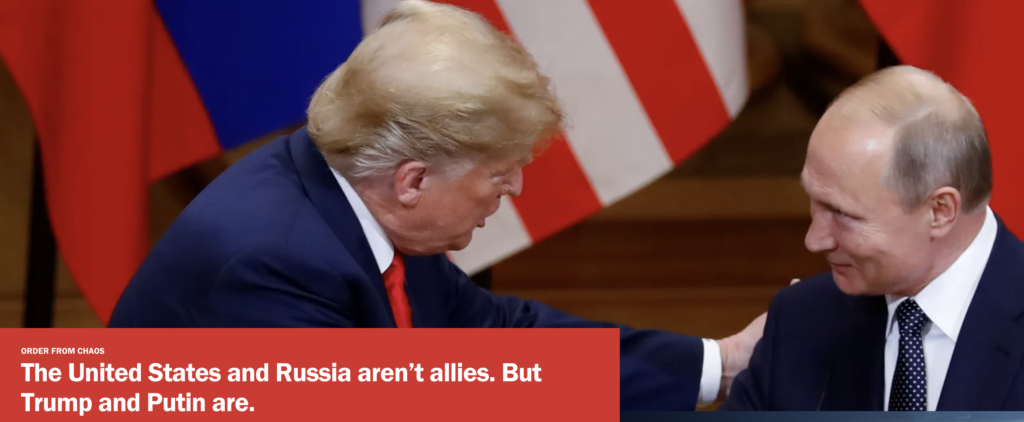
Several people have asked what I think about what is happening with Putin, and Ukraine, and Putin’s rhetoric, and whether Putin will start a nuclear war. I have no more expertise about military theory than my dog Delbert, so I will stick to talking about rhetoric. But the rhetoric here is interesting, because much of what is happening is the playing out of the rhetoric of deterrence. Deterrence is often described as a strategy in international relations, but it’s all about rhetoric—about persuading people to act as you want by threatening them with violence.
Mike Pence’s recent comments exemplify what can only be called simplistic deterrence theory. He said that it’s no wonder that Putin chose to invade Ukraine in 2022, because “weakness arouses evil.”
Pence thereby exemplified how not to think about deterrence. Looking strong doesn’t necessarily stop evil, and he should know that, because the US has had a lot of foreign policy disasters grounded in the kind of simplistic deterrence theory he’s advocating. In other words, he’s either sincerely advocating a version of deterrence that is incredibly flawed, in which case he’s far too ignorant about foreign policy to be in a position to determine it, or he’s shamelessly and cynically using this moment to hurt Biden by advocating a model of foreign policy even he knows is wrong.
Either way is irresponsible.
In a realm of toxic masculinity, and both Trump and Pence are deep in that world, people either submit or dominate. People who are submitting can pretend they aren’t by submitting to the leaders, although they are, by framing their submission as joining in a group that dominates others. It’s domination by proxy. (Erich Fromm made this argument a long time ago about Nazis.)
More important, I think the most plausible reading is that Putin invaded the Ukraine when he did because he didn’t think the US was weak, and he certainly didn’t think Biden was—he thought Trump, pro-Trump media, and the GOP would step in line (as they generally have) and support him. He took a gamble that the GOP would submit to his domination of Ukraine. It wasn’t a bad gamble.
He probably thought he could also reliably count on a lot of media and pundits on other places on the political spectrum, and therefore probably believed that Biden would have been hamstrung in responding effectively. Again, he wasn’t entirely wrong, and how various groups, including parts of the GOP but not just the GOP, have responded remains extremely troubling. That’s the first part of this post. The second part is about Putin’s invocation of the irrational actor, also a rhetorical choice.
I. Pro-Putin rhetoric.
The most charitable interpretation of what he was doing is that he was endorsing a very simplistic version of the larger category of foreign policy called “deterrence theory,” which, even in its more subtle versions is vexed. The most charitable version is that he is completely ignorant about how deterrence works. (The less charitable version is either that he thought Trump took a strong line in regard to Russia, or that he cares more about hurting Biden than furthering intelligent deliberation about a very fraught situation.) In its crudest form (e.g., Pence’s), it says that looking like the kind of person or nation who will respond with maximum aggression will deter anyone from acting in ways we don’t want.
The deterrence model has a long history, and it isn’t particular to any one culture. Sun Tzu (fifth century BCE) writes about it, as does Thucydides (also in the fifth century BCE, in the character of Cleon, who is a demagogue). That the deterrence model is problematic isn’t news; a major point in Thucydides’ history is that adopting Cleon’s notion of responding with maximum aggression was a bad choice, and played out with moral catastrophes like the extermination of neutral city-states, and the practical consequence of pushing neutral or potentially allied city-states into enemies. Threatening aggression and deciding to look strong has often galvanized groups (as happened with both the French and American Revolutions). Even people highly supportive of the “War on Terror” agree that how it was done benefitted terrorists (for a good summary of that argument, see Richard English’s Modern War). Pence’s simplistic deterrence model has been the basis of much US foreign policy post-WWII, and therefore also the object of much criticism since then. After all, a model of foreign affairs that got us Vietnam, Iraq, Afghanistan (twice), Soviet meddling in the US “sphere of influence,” 9/11, and various other failures is pretty clearly not a guaranteed success.
Sometimes it provokes, rather than prevents, war. It does so even when the opponent believes that the threats of an aggressive response are sincere. If they believe that war is inevitable, and this is their best chance to get what they believe they need, then “deterrence” is actually provocation. This is called the “closing window of opportunity” motive for going to war, and deterrence can persuade people they’re facing a closing window. Times that “deterrence” has plausibly caused war include the Japanese attack on Pearl Harbor, WWI (as far as the Russian mobilization), how the French reacted to the Duke of Brunswick’s threats, the Peloponnesian Wars, and so many other cases.
This isn’t news to scholars of rhetoric. If I say that I’ll fire you next week for stealing if you keep doing it, I haven’t necessarily deterred you from stealing. If you’re stealing because you have no way to get your family food, you’ll just steal more immediately. I’ve created a window of opportunity for you.
If I communicate effectively that I am rigidly committed to holding on to dominating you, you don’t necessarily decide that your best choice is to submit. I’ve motivated you to take risky strategies to avoid my domination. In 427 BCE, that’s what Diodotus (in Thucydides) told Cleon (an advocate of Pence’s kind of deterrence theory) said would happen if Athens adopted Cleon’s policy. Eleven years later, Athens had adopted Cleon’s strategy, and Melos behaved as Diodotus said city-states would.
Deterrence works as long as it persuades a potential aggressor that they will not be allowed to get what they want through military action. It doesn’t work if they believe that they have no choice other than aggression, the threats of counter-aggression are bullshit, they can win even if there is an aggressive response, God is on their side so rational assessments of military strength don’t matter, they are in an apocalyptic battle, anything is better than submitting, and various other scenarios.
Clausewitz famously said that people engage in war for political goals. If political leaders are persuaded they can achieve their political goal without war, they won’t engage in it. If they think they can get it by threatening war, they’ll threaten it. If they are persuaded that they can get that goal only through war, then they’re likely to go to war; the more that they are persuaded that other countries will allow them to get what they want through war, the more extreme their demands; if they are persuaded that the war has gotten what they want, they’ll negotiate an end to the war; if they are persuaded that their existence as a political leader depends on their winning the war, then they’re likely to take outrageously risky gambles. If there is something a leader wants, and it can be attained through war, but only if they move faster than their opponents can mobilize support, then deterrence provokes rather than deters war.
None of what I’ve said in the previous paragraph is news to anyone even passingly familiar with the scholarship in deterrence theory—looking strong doesn’t guarantee a good outcome, aggressors don’t act because they think the others are weak. Either Pence is completely ignorant of what scholarship says, and he has no advisors passingly familiar with that scholarship, or else he does, and he knowingly lied in order to take a swipe at Biden. He put factional politics above everything else. Neither of those explanations makes him someone who should be involved in determining foreign policy.
Putin invaded Ukraine because he believed that he could present the world with a fait accompli, and because, I think, he believed that the US would be unable to stop him. Not because Biden is “weak,” but because Trump and pro-Trump media would support Russia’s aggression shamelessly, and so Biden would be unable to mobilize the support for Ukraine. Putin may have believed that invading while Biden was President would help Trump get reelected, and then he’d have a loyal supporter back in the White House.
Once again, he wasn’t entirely wrong.
Right up to and even after the moment of invasion, Putin has been able to count on people all over the political spectrum being willing to repeat Russian propaganda. But, particularly important would be his sense that he could get the GOP to support him. Given how supportive Trump was of Putin (I keep thinking about their unprecedented private meetings), how much large swaths of the GOP admired Putin, how much Putin openly worked for Trump, Trump’s hostility to Ukraine (which helped Putin), how much Trump undermined NATO (which Putin liked), Trump never doing anything Putin didn’t like, coupled with the tendency for Trump’s base and supportive media to flip positions when Trump signals, Putin might have believed that Trump could get the GOP to support the invasion. Putin could count on pro-Russian mouthpieces like Carlson, Greenwald, Chomsky, QAnon, and so many others. And, if so, Putin wasn’t entirely wrong—look at how long it took Tucker Carlson to change his position, what Carlson and Greenwald are still saying, and how Trump initially responded, and who even now has only muted criticism. Even Pence’s comment and what Hannity said recently shows that GOP pundits and political leaders are thinking about this situation more in terms of how they might damage Biden than what is the long-term right thing to do.
I also just have to say that a party that claims to be the Christian party that consists entirely of people who do and say things they fling themselves around like over-tired toddlers if done to them makes me alternately angry and despairing. When Jesus said, “Do unto others as you would have them do unto you,” he neither mumbled nor said, “Unless they’re Democrats.” A party that claims to be Christian could start by behaving as Jesus said very clearly we should behave.
And Pence fails that standard.
If Pence is right about weakness, then he’s wrong about which President signalled weakness. After all, Putin, who has wanted to invade Ukraine for some time, said he wanted Trump to win the 2016 election.
And Pence is the reason we still have a democracy.
I believe that we need a world in which many points of view are represented and are assessed by the same standards of argumentation. We need people who want small government, big government, state control, federal control, support for small businesses, policies that help international trade, and so much so on. I’m not advocating a world in which all points of view are considered equally valid; I’m advocating a world in which all policy agenda are held to the same standards of argumentation.
And Pence’s comment about “weakness” would sink like a rock. And he is among the best that the GOP has to offer, and Trump was hoping the insurrectionists would stop him.
We’re in a culture of demagoguery in which someone like Pence, who has principles, is still willing to engage in the kind of rabid partisanship that ends democracy. Pence helped Putin by trying to use this moment to undermine Biden.
II. The rhetoric of the irrational actor
When I was working on proslavery rhetoric, it became clear that there is a lot of political capital that can be gained by looking irrationally committed to the in-group (and stupid in-group policies). If you treat interactions as domination/submission, and you look as though you will do anything other than submit, you can get your interlocutors to go to ridiculous lengths to appease you. (This is why we have a cat whose vet makes house calls.) I thought this was an important insight.
Turns out that scholars in International Relations figured that out in the 60s, and that much of what both LBJ and Nixon did was in service of acting out that position. The idea was that, if they communicated that the US was willing to go to irrational extremes to punish the North Vietnamese, the North Vietnamese would come to the table willing to negotiate. Simplistic deterrence theory says that one way you can make people submit is by looking so irrational that others will submit. Look at how well that worked for LBJ and Nixon (and note that Nixon adopted it even after it hadn’t worked for the French or LBJ).)
What simplistic deterrence theory ignores is what one of the basic theorists of war (Thucydides) says very clearly.
Thucydides says that, for reasons relevant to its war with Sparta, Athens approached Melos and said, you can either become a vassal state of ours (i.e., cease to exist) or we will exterminate you. So, they presented two kinds of extermination. Were the simplistic version of deterrence theory correct, then the Melians would have submitted. They didn’t. They were exterminated. The Poles fought Hitler, knowing they would lose. Ukrainians are fighting Russia. Vietnamese fought France and the US. People fight even when they think have no chance of winning. Putin didn’t expect that.
Putin is adopting the stance of the irrational rhetor who has to be appeased. He flirts with appearing just irrational enough that he might start a nuclear war to get his way. That he’s flirting with it so strategically suggests to me that he isn’t all that irrational. Again, I know nothing about military theory, but I do know about the posture of the irrational rhetor, and that is what Putin is adopting. He isn’t completely irrational, in that he doesn’t have a personal history of behaving irrationally, but abusively. I suspect that the people who believe that he will win in Ukraine, and he will reduce it to rubble, are right. He will do so because, like Pence, he believes in simplistic deterrence theory. Whether Ukraine can hold him off long enough for him to sue for peace is not something about which I have an even remotely informed opinion, but, if they can–with world support–that would be good. But, even if he wins, the world needs to say this is his last win.



